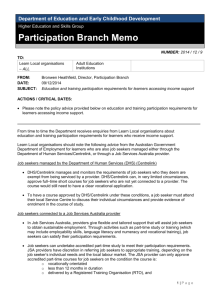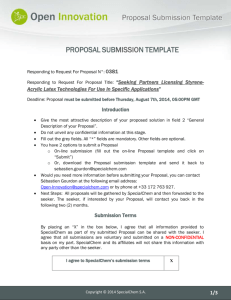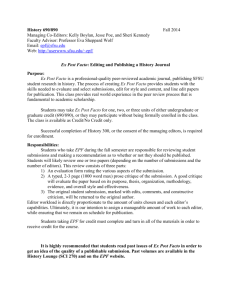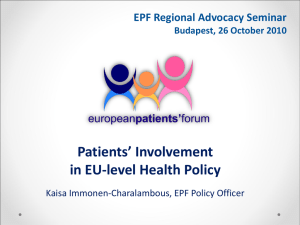Employment Pathway Fund Guidelines
advertisement
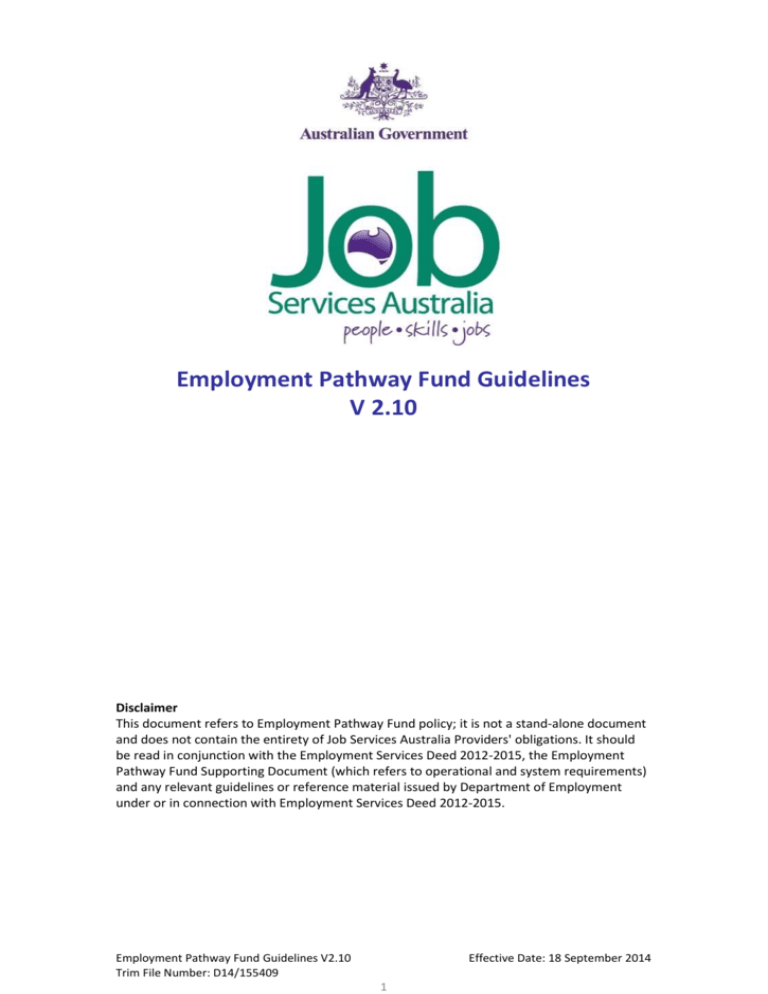
Employment Pathway Fund Guidelines V 2.10 Disclaimer This document refers to Employment Pathway Fund policy; it is not a stand-alone document and does not contain the entirety of Job Services Australia Providers' obligations. It should be read in conjunction with the Employment Services Deed 2012-2015, the Employment Pathway Fund Supporting Document (which refers to operational and system requirements) and any relevant guidelines or reference material issued by Department of Employment under or in connection with Employment Services Deed 2012-2015. Employment Pathway Fund Guidelines V2.10 Trim File Number: D14/155409 Effective Date: 18 September 2014 1 Table of Contents Summary Reference documents relevant to these Guidelines: The Employment Pathway Fund Document Change History Employment Pathway Fund Guidelines V2.10 Trim File Number: D14/155409 3 3 5 22 Effective Date: 18 September 2014 2 Employment Pathway Fund Guidelines Changes in this version: Version Start Date Effective Date End Date Change & Location Policy: Change to the period of time in 2.10 18 Sep 14 18 Sep 14 which a wage subsidy agreement must be signed (page 16). 2.9 11 Sep 14 11 Sep 14 17 Sep 14 Policy: Removed requirement for retaining evidence about how medicare rebate was payable. Policy: Added Medicare gap payment information to Medical Dental and Optical costs subcategory under Professional Services. Policy: Clarification on restrictions that apply to Stream 1-4 Rent and Crisis accommodation that were inadvertently removed in previous version. For history of changes to these Guidelines see Document Change History at the end of this document. Summary The Employment Pathway Fund (EPF) is a flexible pool of funds held by Department of Employment which is nominally credited to the Job Services Australia (JSA) provider (from hereon referred to as ‘JSA provider’) at the Site level. These Guidelines outline the JSA provider’s responsibilities when accessing the EPF. Please note operational and system requirements are outlined in the EPF Supporting Document. EPF is to be used to assist Fully Eligible Participants (from hereon referred to as ‘job seekers’) and Drought Force Only Participants. Employment Services Deed 2012-2015 Clauses: Clause 12.5 – Criminal Records Check Clause 60 – Employment Pathway Fund – General Clause 61 – Employment Pathway Fund Reimbursements Clause 72 – New Enterprise Incentive Scheme Clause 85 – Drought Force Only Services Annexure E – Definitions Reference documents relevant to these Guidelines: Employment Pathway Fund Supporting Document NEIS Overview and Purchasing NEIS Services Guidelines NEIS Training Activity Guidelines NEIS Assistance and Business Mentoring Guidelines NEIS Allowance Supporting Material Setting Up and Managing a Work Experience Activity Guidelines. Work Experience and the Compulsory Activity Phase Guidelines Transfers Guidelines Documentary Evidence Guidelines for Claims for Payment Guidelines Barrier Management Tool (BMT) Advice Employment Pathway Plan Section and Activity Codes Advice Insurance and Incident Management Guidelines Employment Pathway Fund Guidelines V2.10 Trim File Number: D14/155409 Effective Date: 18 September 2014 3 Explanatory Note: 1. Italicised text is a hyperlink to the relevant reference material; 2. All capitalised terms have the same meaning as in Employment Services Deed 2012-2015 (the Deed). 3. In this document, “must” means that compliance is mandatory and “should” means that compliance represents best practice. 4. The allowable EPF expenditure and prohibited items are now at Attachment A: - examples of allowable EPF expenditure is marked with a tick - prohibited items are marked with a cross . Employment Pathway Fund Guidelines V2.10 Trim File Number: D14/155409 Effective Date: 18 September 2014 4 The Employment Pathway Fund Who is Responsible: What is Required: 1. JSA provider JSA providers must ensure that all purchases claimed through the EPF meet the requirements under the Employment Services Deed, the EPF Guidelines and the EPF Supporting Document. EPF is available to assist job seekers and Drought Force Only participants Employment Services Deed 2012-2015 Clause References: Section 3G – for all EPF references Clause 60.1-60.2 – for use of the EPF Clause 60.19 – for EPF as a nominal account Clause 60.21 – for acquittal of Group-based Work Experience Activities Annexure F – Definitions: Fully Eligible job seeker, Employment Pathway Fund, Group-based Work Experience Activity 2. JSA provider Check EPF purchase is made in accordance with the EPF Principles Employment Services Deed 2012-2015 Clause References: Clause 60.4 – for EPF Principles Clause 85.5 – for Drought Force Only Services reimbursement through EPF 3. JSA provider General assistance Employment Services Deed 2012-2015 Clause References: EPF must only be used to assist Fully Eligible job seekers and Drought Force Only participants. The level of assistance provided through the EPF must have regard to the job seeker’s barriers and level of disadvantage and must be tailored to the individual, as identified in the job seeker’s Employment Pathway Plan or Barrier Management Tool. EPF credits are not limited to an individual and can be used flexibly to provide services to any job seeker or group of job seekers, except where the credits are identified for use for Early School Leavers or job seekers receiving a Labour Adjustment Package - refer to Section 9 of these Guidelines. The JSA provider must pay for purchases and then seek reimbursement through the EPF. The only exception is groupbased Work Experience Activity advance payments. For information on EPF and Work Experience Activities refer Work Experience Guidelines on the Provider Portal page Stream Services > Client Information > Work Experience > Setting Up and Managing a Work Experience Activity Guidelines. EPF uses a principles-based approach to allow optimum flexibility. The principles to which JSA providers must adhere when making purchases through the EPF are: 1. Goods and services must be commensurate with the needs of the job seeker or Drought Force Only participant. A job seeker in Stream 4 is likely to receive greater assistance through the EPF than a job seeker in Stream 2. Drought Force funding can only be used for Drought Force activities. 2. Assistance purchased must comply with any work, health and safety laws that may apply. 3. Goods and services must represent value for money. JSA providers must actively seek the best possible rate for goods and services but balance these against the specific needs of the job seeker (for example, the timeliness of interventions). 4. Goods and services must be capable of withstanding public scrutiny and must not bring Employment Services into disrepute. EPF must be used to assist job seekers to overcome their vocational and non-vocational barriers. Attachment A contains a list of items (by category and subcategory) that can be purchased through the EPF, in accordance with the Deed (these are marked with a tick ). Employment Pathway Fund Guidelines V2.10 Trim File Number: D14/155409 Effective Date: 18 September 2014 5 Who is Responsible: Clause 60.5(b)(i) – for services a Provider is already contracted to provide Clause 60.5(b)(iii) – for wage subsidy requirements Clause 60.6 – for in-house services Clause 51.5 – for mode of contact for Additional Contacts Clause 72.14(b) – for additional NEIS assistance payments Annexure E – Definitions: Outreach, Own Organisation, labour Hire Company, Contact, Exceptional Circumstances, Work Trial 4. JSA provider Standard Rates Professional Services Employment Services Deed 2012-2015 Clause References: Clause 61.2A – for Professional Services What is Required: The relevant categories and subcategories are: General assistance o General expenditure o Expenditure that job seekers would be expected to meet o Expenditure that JSA providers would be expected to meet Clothing and presentation Accredited interpreter services Pre-employment checks and work related documents Professional Services o Drug and alcohol counselling and rehabilitation, including mental health, vocation, family or anger management issues o Financial counselling Provider Services o Additional Contacts o Post-placement Support o Reverse Marketing o Mentoring o Outreach Services o Provider Transport Costs o Skills Assessment Tools o Intensive Activity Wage subsidies, including paid work trials Relocation assistance Short term childcare assistance Stream 1-3 rent and crisis accommodation only Stream 4 only assistance Tools, mobile phones and equipment Training course Training books and equipment Transport and licensing assistance Work experience activities NEIS and Self-Employment o NEIS additional support o Business support Other When seeking reimbursement for internally delivered Professional Services, the following hourly rates apply. Services delivered by non-professionally qualified staff: $84 per hour ($1.40 per minute) GST inclusive for Stream 1 and 2 job seekers $93 per hour ($1.55 per minute) GST inclusive for Stream 3 and 4 job seekers Services provided by allied health professionals: $150 per hour ($2.50 per minute) GST inclusive for services provided by a qualified psychologist $125.40 per hour ($2.09 per minute) GST inclusive for Employment Pathway Fund Guidelines V2.10 Trim File Number: D14/155409 Effective Date: 18 September 2014 6 Who is Responsible: What is Required: services provided by other qualified allied health professional (e.g. counsellor, occupational therapist, and social worker). Where a Professional Services intervention is delivered through group counselling the JSA provider must only charge the hourly rate across all job seekers. To claim the allied health professionals rate, JSA staff delivering Professional Services must: possess a degree or graduate diploma in: a. applied health sciences or behavioural sciences b. social work c. rehabilitation counselling, or d. other allied health qualification, and where the discipline to which the qualification relates requires registration to practice, must be currently registered with a relevant registration authority, or where the criterion above is not applicable, must be currently eligible for full membership of a professional association related to the qualifications relied on by the applied health sciences. Refer to relevant State or Territory Government Health Agency for the applicable classification of allied health professionals. 5. JSA provider Standard Rates Provider Services When seeking reimbursement for Provider Services standard rates apply for Additional Contacts, Post-Placement Support, Reverse Marketing and Mentoring. For remaining subcategories costs are reimbursed on a dollar for dollar basis. The Department’s standard rates for Provider Services are: $84 per hour ($1.40 per minute) GST inclusive, for job seekers in Streams 1 and 2 $93 per hour ($1.55 per minute) GST inclusive, for job seekers in Streams 3 and 4. If a JSA provider believes that the costs of undertaking the service exceeds the standard rate, they are required to provide justification to, and obtain approval from, the Department’s Account Manager to use a higher than standard rate. In determining whether to approve an increase (for one-off instances or ongoing), the Account Manager will consider: - the level of service being provided to the job seeker - the local labour market conditions and other external factors that may impact on the delivery of in-house services and - the JSA provider’s service history. JSA providers will be required to submit a Special Claim in the ESS if approval has been granted for a higher than standard rate. 6. JSA provider Outreach Services Employment Services Deed JSA providers may seek reimbursement for the delivery of Outreach Services from designated Outreach Sites. This expenditure is allowable where the job seeker is located sufficiently far from the JSA provider’s full-time or part-time Employment Pathway Fund Guidelines V2.10 Trim File Number: D14/155409 Effective Date: 18 September 2014 7 Who is Responsible: 2012-2015 Clause References: Clause 60.7 – for Outreach services What is Required: site(s). See note below. Note: The actual distance that makes it impracticable for the job seeker to attend the Site in person will vary according to road conditions, access to public transport and whether job seekers normally travel from the Outreach location to the town or city where the JSA provider’s Site is located. As a general guide, only travel times greater than 90 minutes each way by the transport normally available to the job seeker would be considered impracticable. Generally, EPF Outreach expenditure is not permissible where travel time for a JSA provider is less than 90 minutes away from their Full-Time or Part-Time Sites. Where job seekers do not have their own transport and there is no public transport available, JSA providers may put forward a case to their Account Manager seeking a waiver to the impracticable distance requirement. Establishing an Outreach Site Where a JSA provider wishes to provide Outreach Services, JSA providers and the Department will be required to make a contract variation to the Deed’s Schedule if they do not have an approved Outreach Site. The Outreach site must be formally established and the associated Outreach Business Plan and costings must be approved by the Departmental Account Manager prior to any costs being incurred and reimbursed through the EPF. JSA providers are expected to deliver Outreach Services according to the servicing arrangements outlined in the JSA provider’s Deed and pre-approved Outreach Services Business Plan. Further details about the Business Plan can be found in the EPF Supporting Document. 7. JSA provider Prohibited items Employment Services Deed 2012-2015 Clause References: Clause 60.4 – for EPF principles Clause 60.5 – for prohibited items 8. JSA provider NEIS mentoring / selfemployment Employment Services Deed 2012-2015 Clause References: Clause 60.14 – for quarantining of credits A range of items cannot be purchased through the EPF because they do not align with the EPF principles. Attachment A contains a list of prohibited items which are marked with a cross . Relevant categories include: General Items Expenditure that job seekers would be expected to meet Expenditure that JSA providers would be expected to meet Wage Subsidies Outreach Servicing Costs Mentoring related activities Post-placement support activities Professional services Reverse marketing related activities A proportion of all EPF credits arequarantined to fund New Enterprise Incentive Scheme (NEIS) mentoring. This allows the Department to allocate NEIS mentoring payments to NEIS providers on behalf of JSA providers through the Department’s IT System. A systems-generated invoice is sent to the referring JSA provider on behalf of the NEIS provider for each claim for payment. Employment Pathway Fund Guidelines V2.10 Trim File Number: D14/155409 Effective Date: 18 September 2014 8 Who is Responsible: for NEIS payments Clause 60.16 – for access to quarantined NEIS credits Clause 72.13 – for NEIS Training payments Clause 72.14(a) – for NEIS payments What is Required: Note: The EPF NEIS levy does not fund NEIS training; additional NEIS mentoring or support (for Stream 3, 4 or Aboriginal and Torres Strait Islander job seekers) or business support. 9. JSA provider Confirm that sufficient EPF credits are available JSA providers must not enter into commitments in anticipation of future EPF credits. JSA providers are advised to pay particular attention to confirming that sufficient funds are available to support Labour Adjustment Package (LAP) and Early School Leaver (ESL) job seekers. Employment Services Deed 2012-2015 Clause References Clause 60.3(e) – regarding not anticipating future credits Clause 60.14 – regarding use of LAP and ESL credits Clause 60.16(a) – regarding increase in credits for LAP Fully Eligible job seekers Further NEIS programme information can be found on the NEIS specific Provider Portal page. Refer table at Attachment A for additional information on additional NEIS mentoring/support and business support. These job seekers receive a LAP or ESL credit when they commence in Stream Service (in addition to the general EPF Stream credit). The additional credit must only be used on a LAP or ESL job seeker. The Department reserves the right to recover monies if ESL credits or LAP funds are spent inappropriately. The current LAPs are: Textiles, Clothing and Footwear Structural Adjustment Programme (TCF SAP) (1 July 2005 to 30 June 2015) – Stream 3 services and a credit of $1780 BlueScope Steel Labour Adjustment Programme (BSS LAP) (1 July 2011 to 30 June 2015) – Stream 3 services and a credit of $1780. Forestry Industry in Tasmania Structural Adjustment Programme (FIT SAP) (1 June 2011 to 30 June 2016) – Stream 3 services and a credit of $1780. Automotive Industry Structural Adjustment Programme (AISAP) (1 November 2008 to 30 June 2018) – Stream 2 services and a credit of $450* * On 1 July 2014, LAP EPF credits under the AISAP changed from $1,780 to $450. Job seekers who commenced in AISAP prior to 1 July 2014 remain eligible for a minimum of Stream 3 services and the LAP EPF credit is $1,780. 10. JSA provider Transfer of EPF credits between sites and between JSA providers Employment Services Deed 2012-2015 Clause References: Clause 60.15 for transferring EPF credits between Sites Clause 60.12 (a) for relocation of job seekers or Drought Force Only JSA providers may transfer EPF credits between their own Sites. Transfers between Sites within the same ESA do not require the Department’s approval. Transfers between Sites located in different ESAs must have the Department’s prior approval. ESL and LAP credits must only be transferred when an ESL or LAP job seeker is transferring. The Department will consider the following when determining whether to approve the transfer: the effect on job seeker servicing in the ESA the receiving Site’s EPF credit management history any other extenuating circumstances Employment Pathway Fund Guidelines V2.10 Trim File Number: D14/155409 Effective Date: 18 September 2014 9 Who is Responsible: Participants and change of JSA provider Clause 60.13 (b) for relationship failure and transfer by agreement Annexure E – Definitions for Site What is Required: JSA providers or the Department may transfer EPF credits to another JSA provider in cases where a job seeker/s is transferring between JSA providers: where job seekers are transferring between JSA providers, the maximum amount of EPF credits that can be transferred at any one time is $100,000 ESL and LAP credits must only be transferred, where agreed, when an ESL or LAP job seeker is transferring. Where a job seeker is being transferred between two JSA providers by agreement, the providers will also agree on the EPF amount to be transferred. The amount of EPF to be transferred with the job seeker may take into account the following: the amount previously credited to the EPF for the job seeker the amount of EPF previously spent on the job seeker the effect on job seeker servicing by the JSA provider, especially in cases where more has been spent on the job seeker than has been credited the significance of the adjustment for the receiving JSA provider, especially in cases where only minimal credits are available (such as for Stream 1 Participants) any other extenuating circumstances for the transfer. 11. JSA provider Confirm Documentary Evidence The JSA provider must retain Documentary Evidence to confirm the goods or services have been purchased before the amount can be reimbursed through the EPF (except in the case of Advance Payments for Work Experience Projects which must be acquitted at a later stage). Employment Services Deed For details on Documentary Evidence refer to the Documentary 2012-2015 Clause References Evidence for Claims for Payments Guidelines Clause 19.4 for general payment requirements Clause 61 for EPF reimbursement Clause 61.2 for purchases of $300 or less Clause 61.2A for additional documentary evidence requirements Employment Pathway Fund Guidelines V2.10 Trim File Number: D14/155409 Effective Date: 18 September 2014 10 ATTACHMENT A Examples of items that CAN be purchased through the EPF are marked with a tick Items that CANNOT be purchased under the EPF (Prohibited items) are marked with a cross EPF Category Subcategory Characteristics / Description of purchases Services, products or assistance provided to partially eligible Stream 1 job seekers Goods or equipment that are not related to overcoming a job seeker’s vocational or non-vocational barriers to employment Cash payments to job seekers (except some assistances for Stream 4 job seekers), or gifts or other vouchers that can be redeemed for cash Services or luxury personal care items such as beautician visits, pamper packs, gym membership, weight reduction services and nicotine patches Contacts with the job seeker, an education/training provider or employer that are solely for the purpose of verifying General employment or tracking an Outcome expenditure Computers, printers, facsimiles, photocopiers or similar assets Rewards, gifts and incentives for employers other than wage subsidies Items that employers could be expected to pay for as a standard condition of work such as non-portable work goods (for example heavy machinery), worker’s compensation and insurance Relocation costs for job seekers relocating overseas GENERAL ITEMS Assistance to gain a drivers licence after loss through drink or drug driving; this includes assessments/driving courses or other support such as paying for the application fee to reapply or renew a driver’s licence The contact and process of conducting a Skills Assessment, which is covered under Service Fees Expenditure Rent and bond monies (except where a job seeker is relocating to take up employment or where allowable under that job Stream 1-3 Rent and Crisis Accomodation or Stream 4 Only Assistance ); food and household bills (except when seekers would assistance is being provided to Stream 4 job seekers); internet connections be expected Fines, court fees to meet Pay out of loans or credit cards Expenditure Costs and overheads associated with the provision of Services under this Deed that JSA Costs and overheads of administering the EPF providers JSA provider’s legal costs would be The hire of security guards for a JSA provider’s premises expected to meet Employment Pathway Fund Guidelines V2.10 Trim File Number: D14/155409 Effective Date: 18 September 2014 11 Allowed EPF Category Subcategory Partial Capacity to Work (PCW) job seekers GENERAL ITEMS CLOTHING AND PRESENTATION ACCREDITED INTERPRETER SERVICES PRE-EMPLOYMENT CHECKS AND WORK RELATED DOCUMENTS Drug and alcohol counselling and rehabilitation, PROFESSIONAL including SERVICES mental health, vocation, family or anger management issues Characteristics / Description of purchases A JSA provider cannot require a job seeker to participate in an activity or intervention where the hours involved in that activity or intervention are beyond the Partial Capacity to Work (PCW) ‘with intervention’ bandwidth. Job seekers may volunteer for activities or assistance which would require participation above their PCW bandwidth (‘baseline’ or ‘with intervention’). In such cases, the provider may use the EPF to provide a wage subsidy or access to training to the job seeker (as long as all other conditions for the use of the EPF are met). Allowed In this instance providers must ensure the job seeker understands that this is voluntary and must include the activity or assistance in the voluntary section of the job seeker’s Employment Pathway Plan (EPP). Providers must also ensure that the specifics of the job seeker’s Employment Services Assessment (ESAt) are taken into account before a decision about whether to provide support is made; such as, for example, weight or other restrictions on lifting, extended periods of sitting or standing, specific restriction on the hours of work or required rest periods. Note: Information on reimbursement processes can be found in the EPF Supporting Document. Work clothing or clothing purchased for a job seeker to improve their presentation to facilitate access to employment or training opportunities (for example, hygiene packs and basic haircuts) Accredited interpreter services purchased for an eligible job seeker for employment or job search related activities or regular Contacts with their JSA provider. For more information please refer to the Providing Interpreter Services Supporting Document. JSA providers may claim accredited interpreter services fees in situations where an interpreter is arranged, but the job seeker does not attend their scheduled appointment Legitimate costs related to obtaining pre-employment or other background checks or documentation needed for work that are not normally paid by an employer For these services EPF can be used to fund the face-to-face component of the appointment (ie billable time). The standard rate takes account of unbilled work that is for tasks such as writing case notes and letters, phone calls and associated administration. In the industry this is often referred to as 66 per cent productivity (one hour of billable work assumes an additional half hour of unbillable work). If services are purchased externally or internally, consideration should be given to the job seeker claiming a rebate under Medicare or Private Health Insurance. The EPF may be used to fund the gap fee, after deducting any rebates received. Employment Pathway Fund Guidelines V2.10 Trim File Number: D14/155409 Effective Date: 18 September 2014 12 EPF Category PROFESSIONAL SERVICES Subcategory Characteristics / Description of purchases Allowed Personal development for addressing self-esteem and confidence issues Medical, dental and optical costs. This includes where a Medicare gap is incurred, as a result of medical treatment directly associated with an injury received in the course of undertaking a Work Experience activity not covered by the Department’s insurance. Providers can only self-approve amounts totalling up to $1000 (GST exclusive). Amounts beyond this require Account or Contract Manager approval. Providers must follow instructions as provided in the Insurance and Incident Management Guidelines. Medication Vocational rehabilitation for job seekers to re-enter employment Financial counselling Services over and above contractual requirements and where such services are not available for free. Note: Financial counsellors who are employed with a Community Service Agency do not charge fees. Charging a fee to a client in Financial Hardship or presenting with a financial problem such as debt, is not acceptable to Financial Counsellors and the Financial Counselling Associations around Australia Rescheduling appointments PROFESSIONAL SERVICES – Missed Professional Service appointments / Did not attend appointments (DNA) Reimbursement is only permitted for the missed ‘face to face’ component of the consultation (ie billable hours) EPF reimbursements can only be claimed for up to three DNA appointments per 12 months per job seeker per organisation; the only exceptions are Medical, Dental and Optical For a job seeker who missed more than three scheduled appointments, the JSA provider should seek the job seeker’s agreement to attend further appointments. Note: The 12 month period commences on the date that the first DNA (i.e. the date of the missed appointment) occurs and ceases 12 months later. After the cessation of the 12 month period, JSA providers may then recommence claiming up to three DNAs, per year, per job seeker, per organisation and the 12 month period will again recommence on the anniversary of the first DNA appointment. Information in the comments field of the EPF Record Details screen must clearly identify if the purchase is for a ‘did not attend’ (DNA) appointment. This category will be closely monitored to identify if JSA providers are adhering to the requirement of recording DNA appointments and their associated reimbursement. Where the JSA provider believes that the costs for the professional services may exceed the standard rates, they must seek approval from the Department and provide justification for the increased rate. Employment Services Assessments (ESAts) and Job Capacity Assessments (JCAs) When using the EPF, JSA providers should take into consideration a current and valid assessment to determine the most appropriate assistance to Employment Pathway Fund Guidelines V2.10 Trim File Number: D14/155409 Effective Date: 18 September 2014 13 EPF Category PROVIDER SERVICES PROVIDER SERVICES Subcategory Characteristics / Description of purchases Allowed overcome a job seeker’s barriers to employment. Current and valid assessments may include recommendations for Psychological or other Allied Health Services. More details are available at Referral for an Employment Services Assessment Guidelines. Contacts with eligible job seekers over and above the scheduled Contacts, as set out in the Deed. Additional Contacts Additional must meet the conditions of set out for a Contact including being conducted face to face, as outlined in the Contacts Employment Services Deed and Contacts Guidelines. Include services supplied by the JSA providers to job seekers beyond their contractual obligations. Post Placement Support for job seekers to address issues which are likely to impact on the job seeker’s ability to continue in their employment or education/training placement (ie. the placement may lead to employment/education outcome). Support Post Placement Conducting a risk assessment of the job seeker where there is no reason to believe that their placement is in jeopardy. Support Any other communication with the job seeker, employer or registered training provider that does not address issues likely to impact on the job seeker continuing their employment or education/training placement. JSA providers may claim Reverse Marketing where the JSA provider identifies where the job seeker is best able to find a job, based on their skills and abilities, and then targets employers in that field to present a case for why they should hire the job seeker. Reverse marketing is strategic and tailored to an individual job seeker. It may be appropriate to reverse market a job seeker to a labour hire company, for example, that specialises in construction where the job seeker has relevant skills, who will be the employer of the job seeker, so long as the vacancy did not Reverse exist. Where a JSA provider uses a third party to conduct reverse marketing on their behalf, the EPF can be used to Marketing cover the cost of the third party meeting with the job seeker but only if additional information is needed specifically to facilitate a reverse marketing exercise. For example, a short initial meeting of 15 minutes between the reverse marketing staff and the job seeker to clarify their skills, experience and aspirations may be appropriate. However a short initial meeting with a job seeker cannot replace the information a JSA provider is responsible for giving the external reverse marketing business but enhance the information already provided. PROVIDER SERVICES Reverse Marketing Broad cold-calling approach or mail-outs Ways that promote the JSA provider’s business Where a vacancy already exists, including advertised on radio or in a newspaper or internet recruitment site. (If an employer indicates that they have a vacancy then any attempts to obtain that position for a job seeker is vacancy management, not reverse marketing. For the purposes of vacancy management it does not matter whether the vacancy was communicated directly to the JSA provider from the employer, advertised via mass media or on the local community board.) Any written reverse marketing Reverse marketing to an organisation to place a job seeker onto a list of potential employees An upgrade in the job seeker’s current position Employment Pathway Fund Guidelines V2.10 Trim File Number: D14/155409 Effective Date: 18 September 2014 14 EPF Category Subcategory Characteristics / Description of purchases An Unpaid Work Experience Placement Allowed EPF Category Subcategory Reverse Marketing Characteristics / Description of purchases Any administration time incurred by a JSA provider or a third party used by the JSA provider for reverse marketing; only the actual time the provider or the third party spends completing the reverse marketing can be charged The cost of subsequent discussions, negotiations or confirmation with the employer or the time taken to document conversations, once the JSA provider successfully reverse marketed a job seeker into a job. These activities are considered to be standard services required from the JSA provider to place a job seeker into employment, ie vacancy management. Fees for support provided to job seekers not in an employment or education/training placement (ie. a placement that may lead to an education or employment outcome). Administration/communication with or for the job seeker that does not address issues likely to impact on the job seeker continuing in their training or attending an interview or appointment Setting up interviews or appointments Letters of support Case consultation or phone calls; writing case notes Provider support after the job seeker commenced in an employment or education/training placement – this may be covered under post placement support Note: Psychological or counselling services and case management cannot be claimed as mentoring. Cost for Outreach Services may include: Transportation of staff Venue and equipment hire Costs of staff travel time where the employment consultant was travelling for a considerable period of time and was unable to service other clients or do other work while travelling; Reasonable staff preparation time where it is not possible to access IT systems at the Outreach Service or where additional data entry on return is required. (Depending on the length of the trip and number of clients serviced, the Department deems appropriate preparation time is limited to a maximum of an hour pre visit and an hour post visit.) Any costs not pre-approved in the Outreach Services Business Plan Actual costs of an initial interview and Contacts (as detailed in the Deed) conducted during delivery of an Outreach Service. These costs are part of the Service Fees and cannot be claimed through the EPF Additional Contacts conducted during the delivery of Outreach Services Allowed Mentoring PROVIDER SERVICES PROVIDER SERVICES Mentoring Outreach Service Costs Employment Pathway Fund Guidelines V2.10 Trim File Number: D14/155409 Effective Date: 18 September 2014 15 EPF Category PROVIDER SERVICES WAGE SUBSIDIES Subcategory Provider Transport Costs Skills Assessment Tools Intensive Activity Wage subsidies Characteristics / Description of purchases Costs of providing training to the staff including sub-contractors Costs of undertaking quality control of service delivery activities conducted by a sub-contractor on a provider’s behalf Delivery of Outreach Services in metropolitan areas IT connectivity, laptops, printers, phones and other computer accessories Permanent rental costs Legitimate transports costs incurred by a JSA provider in servicing eligible clients. These costs may include hiring a bus to transfer multiple job seekers to a training activity or employment location. Costs for Outreach Services must not be included in this sub-category. Cost of purchasing a Skills Assessment Tool to assess a job seeker’s current skills, barriers and previous work experience. Only the actual cost of purchasing and/or the cost of accessing the Skills Assessment Tool is claimable through the EPF. Costs associated with conducting an Intensive Activity such as skills training, in-house job search training, participation in the Skills for Education and Employment Program, community work and other activities that are appropriate to a job seeker’s individual circumstances. Payments made to an employer in the form of a wage subsidy package to facilitate employment of an eligible job seeker. Wage subsidies: Must be used only for employment which is sustainable and ongoing. The sustainable and ongoing employment requirement can be satisfied where the employer knows of no reason why the job will not continue indefinitely. Employment should not be expected to end when the wage subsidy ceases. The value of the wage subsidy must be commensurate with the job seeker’s level of disadvantage Wage subsidies must be linked to a vacancy in the Department’s IT System The EPF can be used to subsidise a job seeker’s wage for approximately 26-weeks from the commencement date of the placement. However, to offer an employer a wage subsidy, the duration of the position must not be limited to the duration of the subsidy – except in the case of Work Trials. A wage subsidy gives an employer the capacity to commence a job seeker in a position which is intended to be ongoing and sustainable employment. The employer should make a significant contribution to the cost of the job seeker’s wage by tapering off the value of the wage subsidy over the period of subsidisation Where the employment ceases or the job seeker has an unpaid leave of absence due to illness or other extenuating circumstances, any outstanding wage subsidy owed to the employer must be paid on a pro rata basis for the hours or days the job seeker is employed Where the subsidy is for an upgrade of employment, the wage subsidy may be used to pay for the additional hours only Employment Pathway Fund Guidelines V2.10 Trim File Number: D14/155409 Effective Date: 18 September 2014 16 Allowed EPF Category Subcategory Characteristics / Description of purchases The terms of employment specified in the Wage Subsidy agreement must meet all relevant legislative requirements (including that the wage must be in line with the current National Award conditions) and must be signed by all parties within 28 days from the commencement of wage subsidy. Employment Pathway Fund Guidelines V2.10 Trim File Number: D14/155409 Effective Date: 18 September 2014 17 Allowed EPF Category WAGE SUBSIDIES Subcategory Paid work trials Characteristics / Description of purchases Paid Work Trials are a subset of Wage subsidies and: May be funded through EPF Can only be for a maximum of two weeks Depending on the job seeker’s level of disadvantage the Account Manager may approve 100 per cent of the wage to be paid Allowed JSA providers must seek Account Manager approval for wage subsidies and work trials that equal 100 per cent of the job seeker’s wage costs. If other complementary programmes are also offering wage assistance, the total amount of the wage subsidies must not exceed 100 per cent of the job seeker’s wage costs. WAGE SUBSIDIES Wage subsidies Paid to/or for positions with the JSA provider’s Own Organisation (that is, the JSA provider or that part of the JSA provider that delivers services under the Deed), or another JSA provider Paid to a related entity of the JSA provider, including their Labour Hire Companies where the job seeker is hosted to a Host employer. Note: The Host employer is not responsible for paying the job seeker for their labour or employment and therefore is not the employing entity for wage subsidy purposes For short term and seasonal positions For family members of the employer Claimed or reimbursed in advance, as wage subsidies can only be claimed and reimbursed to the JSA provider once the job seeker has worked for the period covered by the wage subsidy For self-employment Paid to, or for, positions with, Commonwealth or State Government departments or agencies. Note: wage subsidies for employment in local government councils or in ancillary services such as school canteens which are not funded by the Commonwealth or State/Territory Government may be paid for through the EPF Paid to ‘top up’ a job seeker wage that is below the Federal minimum wage or the award rate for the job In excess of 100% of the job seeker’s wage. Additional employment costs such as superannuation or insurance are the employers responsibility The combination of the wage subsidy and any other government funded wage subsidy cannot fully fund (100%) of the job seeker’s wage, without Account Manager approval. Note: The $1000 Experience + Jobs Bonus does not count as a government funded wage subsidy. Employment Pathway Fund Guidelines V2.10 Trim File Number: D14/155409 Effective Date: 18 September 2014 18 EPF Category Subcategory RELOCATION ASSISTANCE SHORT TERM CHILDCARE ASSISTANCE STREAM 1-3 RENT AND CRISIS ACCOMMODATION ONLY Characteristics / Description of purchases Costs associated with the relocation of a job seeker for the purpose of taking up an employment opportunity including furniture storage, travel cost to new location, fares, temporary rental assistance, goods transport and removalist costs, bond assistance, and any other legitimate relocation expenses related to an individual’s circumstances. Costs associated with short term child care to allow a job seeker to attend employment related activities, training or Work Experience activities. For job seekers who are ‘primary homeless’ - those who are living in a squat, sleeping in a car or tent, or have nowhere to stay) as identified in the Department’s IT system. EPF can be accessed if the JSA provider and/or Stream 1-3 job seeker is unsuccessful in accessing support through other non-government or government agencies that provide relevant services for housing assistance and crisis accommodation. Rent Assistance may be provided to assist a Stream 1-3 job seeker for bond or up to four weeks rent to secure a rental property. Crisis Accommodation may be offered for the provision of short term crisis accommodation for a Stream 1-3 Participant such as, but not limited to renting a caravan for up to four weeks; up to three consecutive nights in a hotel; or up to three consecutive nights in a boarding house. JSA providers need to ensure that job seekers circumstance has been updated in the Job Seeker Classification Instrument (JSCI) prior to determining eligibility for this assistance. Job seekers who are secondary homeless or are ‘at risk’ of homelessness STREAM 1-3 RENT AND CRISIS ACCOMMODATION AND STREAM 4 ONLY ASSISTANCE Allowed EPF used to pay for a job seeker’s rent on an ongoing basis EPF used to pay board to a family member or other blood relative If the JSA provider and/or Stream 4 job seeker is unsuccessful in accessing support through other non-government or government agencies that provide relevant services (such as housing assistance, crisis accommodation, emergency relief, or medical interventions) then EPF can be accessed in a range of circumstances. STREAM 4 ONLY ASSISTANCE Stream 4 only assistance is only expected to be used short-term until alternative support is found or job seekers are in a position to support themselves. Short-term assistance under this category includes the cost of: Food vouchers, food items, meals and food for group meals Legal advice for job seekers who do not qualify for legal aid. Legal advice may be required for family or custody issues or legal matters which have arisen as a result of non-vocational barriers Employment Pathway Fund Guidelines V2.10 Trim File Number: D14/155409 Effective Date: 18 September 2014 19 EPF Category Subcategory STREAM 4 ONLY ASSISTANCE TOOLS, MOBILE PHONES AND EQUIPMENT TRAINING COURSE TRAINING BOOKS AND EQUIPMENT TRANSPORT AND LICENSING ASSISTANCE Characteristics / Description of purchases Out of pocket expenses (e.g. Medicare gap fees) for medications, medical appointments, treatment through a specialist or allied health practitioner, and counselling or other professional services related to mental health issues that are not available free of charge Rent assistance such as bond to secure a rental property or rent for up to four weeks to retain a property; and short term crisis accommodation such as renting a caravan for up to four weeks; and accommodation in a hotel or boarding house for up to a week Assisting with essential services such as providing initial connection costs and payment of utility bills. It is expected that payment of bills would only be done in extenuating circumstances which are beyond the control of the job seeker and that payment of bills on more than one occasion would not normally occur. Tools or equipment purchased for job seekers for employment related activities or to facilitate access to employment opportunities. Costs associated with phone usage; this may include the purchase of mobile phones and phone cards to allow the job seeker to be in contact with their JSA provider and potential employers. It is the JSA provider’s responsibility to ensure a job seeker makes the most of a mobile phone purchase and knows their responsibilities. For Stream 4 job seekers, JSA providers may also be able to assist the job seeker with pre-paid vouchers for mobile phones. Includes the cost of enrolment in non-vocational or vocational course or activity. Vocational accredited training must be undertaken through a registered training organisation resulting in obtaining a skill or qualification that will assist in obtaining employment. All other training such as non-accredited non-vocational and vocational training may be conducted in-house or externally. For more information see the Work Experience Activity Types Guidelines and the Government Subsidised Training for the Job Seekers Under the National Entitlement Supporting Document. The cost of books or equipment related to a training activity or education placement. Can be used to fund short-term transport costs associated with ensuring job seekers have the means to attend job search related activities, training and employment. Include: Fares or petrol purchased for job seekers for employment or job search related activities. The cost of motor vehicle driving lessons provided by a professional driving trainer where obtaining a licence will assist the job seeker in overcoming vocational and non-vocational barriers to employment. Contribution to the purchase of any mode of transport for a job seeker (e.g. car). The Department’s approval is required for the purchase of motor vehicles to ensure it meets EPF principles. Costs associated with obtaining professional or work related vehicle licences. Contribution to the cost of short-term vehicle registration, vehicle insurance, and vehicle repairs where these vehicles are necessary for job seekers to take up employment or job search related activities. Employment Pathway Fund Guidelines V2.10 Trim File Number: D14/155409 Effective Date: 18 September 2014 20 Allowed EPF Category Subcategory WORK EXPERIENCE ACTIVITIES NEIS and SelfEmployment OTHER NEIS Additional Support Business Support Characteristics / Description of purchases Overhead and participant costs associated with running Group-based Work Experience activities. Refer Work Experience Activity Guidelines for details. Items for which an Advance EPF payment can be used includes, but are not limited to, the following: the costs of Supervisors, capital equipment, transportation of job seekers and Drought Force Only participants, rent and associated infrastructure, activity materials, site risk assessment, work, health and safety induction training, and other training insurance (limited only to the additional costs of insurance) where the nature of a Group-based (or individual) Work Experience Activity means that it is not covered by Department of Employment-funded insurance, or insurance the JSA provider is required to obtain, being insurance only for the period of the Work Experience Activity the costs of items such as criminal records checks, safety clothing or computers or equipment that are overhead costs associated with a Group-based Activity, and any other items as specified by the Department of Employment from time to time EPF general pool of funds can be used to pay the NEIS provider for the cost of additional mentoring or support to Stream 3, 4 or Aboriginal or Torres Strait Islander NEIS job seekers. Business support for NEIS participants or self-employed job seekers with start-up costs such as insurance or business cards Legitimate costs that do not appropriately fit under any available categories. Comments must clearly identify the purchase. Employment Pathway Fund Guidelines V2.10 Trim File Number: D14/155409 Effective Date: 18 September 2014 21 Allowed Document Change History Version Start Date Effective Date End Date Change & Location 2.8 5 Jun 14 5 Jun 14 10 Sep 14 2.7 27 Mar 14 27 Mar 14 4 Jun 14 2.6 11 Oct 13 11 Oct 13 27 Mar 14 2.5 1 Jul 13 1 Jul 13 2.4 1 Jul 13 1 Jul 13 Policy: Wage subsidy agreement must be signed by all parties prior to or on the start date of the wage subsidy period. Policy: Included the definition of interpreter services Policy: included the changes to LAP credits for Automotive Industry Structural Adjustment Programme Policy: Update for WfD 2014 around transfer of credits. Policy: Partial Work Capacity (PCW) job seekers amended to clarify requirements and volunteering for PCW. Policy: Change to standard rate for services provided by allied health professionals, taking account of rounding for per minute rate. Process: Restructured document entirely; moved all allowable and prohibited EPF items into table at Attachment A Policy: Amended to reflect ending of EPF trial for stream 13 primary homeless job seekers and transition it into normal servicing. Policy: Work trial – A work trial must not exceed the job seekers partial capacity to work. Policy: Report Writing - It is not a requirement for a report to be prepared as part of a professional service intervention through the EPF Policy: Professional Services advice to contact State Governments for applicable Allied Health Professionals. Policy: All references removed regarding Remote due to the implementation of the Remote Jobs Community Programme which commenced on 1 July 2013. Policy: Inclusion of Barrier Management Tool, Section 1 (p10). Policy: Inclusion of statement that it is the JSA provider’s responsibility to ensure all EPF purchases meet contractual requirements Section 1 (p11). Policy: Wage subsidies must meet all relevant legislative requirements; must be linked to a vacancy referral in Department of Employment’s IT Systems; wage subsidies must be signed by all parties prior to the wage subsidy commences; Account Manager approval where the wage subsidy is equal to 100% of the wage; and wage subsidies are not permissible in excess of job seeker’s partial capacity to work Section 3a (p14-15) Policy: Work Trials – where 100% of the wage is to be paid, Account Manager approval is required Section 3a (p15). Policy: Additional Contacts: clarification on when JSA providers can seek reimbursement Section 3a (p16). Policy: Reverse Marketing, further clarification on when it Employment Pathway Fund Guidelines V2.10 Trim File Number: D14/155409 Effective Date: 18 September 2014 22 2.3 14 Feb 13 14 Feb 13 30 Jun 13 2.2 3 Oct 12 31 Oct 12 13 Feb 13 2.1 10 Sep 12 10 Sep 12 3 Oct 12 2 7 May 12 1 Jul 12 9 Sep 12 Employment Pathway Fund Guidelines V2.10 Trim File Number: D14/155409 can be claimed Section 3a (p16). Policy: New sub-category for Mentoring and clarification on mentoring Section 3a (p 16). Policy: Professional Services: clarification on how in-house services are to be calculated; clarification of reimbursement of missed/did not attend Professional Services appointments Section 3a (p18) Policy: Outreach Services: clarification on managing job seeker diary appointments for Outreach Services; Deed Schedule Variation requirement for Outreach Servicing; mandatory requirement for an Outreach Services Business Plan for reimbursement under Outreach Services; clarification that Outreach Services are not covered under Department of Employment standard rates Section 3a (p19). Policy: Removal of Connecting People with Jobs initiative which ceased on 30 June 2013. Policy: Group-based Work Experience Activities are limited to 12 months and information about acquitting advance payments Section 3d (p22-23). Policy: Amendment to NEIS payments Section 3e (p23). Policy: Prohibited Items – services for job seekers above their assessed partial capacity to work Section 5 (p24). Policy: Documentary Evidence, new mandatory requirements for specific categories and sub-categories to be detailed in Employment Pathway Plans or Barrier Management Tools, Section 7 (p26). Policy: Clarification on the assistance allowed and the eligibility for the 12 month Trial for Primary Homeless Streams 1-3 job seekers (p 19) Policy: Inclusion of the training cost sharing arrangements for national entitlement training places (p 10). Policy: Connecting People with Jobs will continue to be available to new participants until 30 June 2013. Policy: Further information to support decisions around Wage Subsidy (p12-13) Policy: Amendment to include Rent and Crisis Accommodation 12 month Trial for Streams 1-3 (p 17-18 – section 3c) Policy: Reference regarding Experience + Job Bonus in relation to EPF wage subsidies (p 12) Policy: Clarification regarding calculating costs for provider services (p 13) Policy: Remove reference to paid purchase orders (p24) Formatting changes Policy: Removal of reference to Job Transition Support throughout the document due to cessation 30 June 2012 Policy: Update of the Compulsory Activity Phase (p 13) Policy: Update to include other background checks (p 8) Policy: Update of Outreach locations in line with Outreach Sites advice (p 10) Policy: General policy update for provider and professional Effective Date: 18 September 2014 23 1.6 26 Aug 11 26 Aug 11 1 Jul 2012 1.5 18 Apr 11 28 Apr 11 26 Aug 11 1.4 15 Dec 1 Jan 11 28 Apr 11 1.3 6 Oct 10 6 Oct 10 31 Dec 10 Employment Pathway Fund Guidelines V2.10 Trim File Number: D14/155409 services (p 12-14) Policy: Update of the Connecting People with Jobs initiative (p 16-17) Policy: Update of policy changes for NEIS payments (p 18) Policy: Amendment to include Early School Leavers (p 20). Policy: Amendment to job search phone use, to include mobile phone pre-paid credit vouchers (p 8-9, 15), Amendment to remove Related Entity Wage Subsidy trial guidelines (P11), Amendment to clarify provision of Post Placement Support and align with changes to Employment Service Assessments (p13), Amendment to clarify Crisis Accommodation timeframes (p14), General wording update to the Connecting People with Jobs initiative (p1618), Amendment to clarify NEIS category selection (p20), Amendment to clarify Prohibited items for contacts with an education or training provider (p20,21), Amendment to align Documentary evidence requirements with Documentary Evidence for Claims for Payments Guidelines (p22). Process: Wording clarification indicating best practice for negotiating Wage Subsidies (p10). Policy: update of the Connecting People with Jobs initiative (p16-18) Policy: Inclusion of the Connecting People with Jobs trial (p 16-18) Policy: Inclusion of Job Capacity Assessment Supporting Intervention information (p 13) Policy: Inclusion of clarification paying wage subsidies at pro rata basis and for local government/ancillary services (p 10-11) Policy: Amendment to exclude the need for JSA providers to seek Contract Manager approval to purchase car registration (p 12) Policy: General wording clarification of work experience activities (p 18) Policy: General wording clarification of Transferring Credits between JSA providers (p 21 section 6) Process: Amendment to clarify standard rates, includes GST, for Services Supplied By JSA providers (p 12-14). Policy: Amendment to include access to EPF for Job Transition Support participants (p3-6, p14 and p15) Policy: Amendment to include access to EPF for paying Wages Subsidies to Related Entities in exceptional circumstances (p 10 – section 3a) Process: Clarify WE Budgets in excess of $20,000 do not require pre-approval fromDepartment of Employment , except where an advance EPF payment is being sought (p 15 – section 3c) Effective Date: 18 September 2014 24 Policy: Included requirement to discuss wage subsidy conditions before signing a wage subsidy agreement (p9 section 3a), Removed reference to GP in regards to medical appointments for Stream 4 job seekers only. This will facilitate other health professionals such as community nurses providing assistance (p14 – section 3b), Included reference to site risk assessment and OHS induction training as additional costs that can be included in advance EPF payments (p14 - section 3c), Removed reference to prohibited expenditure of Work Experience with a JSA Provider or related entity (p16 section 4), Removed sentence ‘Department of Employment will adjust EPF credits where the transfer is a result of relocation or a relationship failure’ to align with ESD4E Clause 60.12 (p17 section 6). 1.2 12 Mar 10 12 Mar 10 6 Oct 10 1.1 18 May 09 01 Jul 09 12 Mar 10 Policy: Amendment to in-house professional standard rates (p12 - section 3a) 1.0 08 May 09 01 Jul 09 18 May 09 Original version of document Employment Pathway Fund Guidelines V2.10 Trim File Number: D14/155409 Effective Date: 18 September 2014 25

